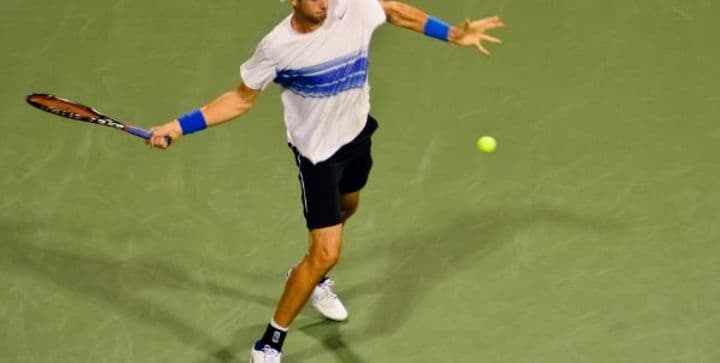Top 4 Reasons College Tennis is the Best Choice for Aspiring Professionals

Former US-Davis Cup captain Patrick McEnroe recommends 98% of aspiring pros to consider college.
"Unless it's a given that you will be a Top 20 player, and you never know that, I think college is a great place to go and mature physically, emotionally. There's great coaching, great facilities, [...]" he says, emphasizing some of the great advantages of college tennis.
1. Increasing age of players
Men's tennis
The ATP top 100 average age of players is +27 years. The development of the sport with the physical component getting more and more important makes it extremely difficult for players to have a breakthrough already at a young age. It's not impossible as few examples show, but the trend over past years has been pretty obvious and will continue. College tennis offers a huge chance which goes well with this trend. You study at college, while you practice and compete at the same time at a high level and under great pressure. If you stay enrolled for the entire four years of eligibility, you graduate at age 23-24, with plenty of time to go pro and just in time for your peak years. John McEnroe, the Bryan Brothers, John Isner, Dominic Inglot (UK), James Blake, Benjamin Becker (Germany), Blaz Rola (Slovenia), or Steve Johnson are just some of the great players, who chose to go to college for shorter or longer before making an impact on the tour.
Women's tennis
Unfortunately that's not the same picture for females. "Yet" we hope, as it's expected what it takes is at least 1 or 2 great stars coming out of college and showing what they're capable of doing on the WTA tour. Lisa Raymond, one of the greatest doubles players ever has shown that college sports for women can also lead to tremendous success. Could Nicole Gibbs and Irina Falconi (USA), who are both ranked within the Top 100, be the ones to contribute to a rise of college tennis popularity on the women's side?
2. Betting on sports and education
Understanding how few players make a good living at an ever-increasing age on the tour, there's obviously a strong rationale for understanding the dangers of turning pro too early: The physical development of a player can only be accelerated to a certain extent, and no one's immune to injuries. At the same time the educational backup plan often suffers tremendously. On top of that betting on tennis exclusively is expensive. With all the risks related even more so.
So what about college tennis, offering a bachelor's degree at university, while at the same time playing top-level tennis? And for all of you guys who love playing tennis, but are not as close to becoming professionals (yet), four years is a long time. It enables you to continue perform sports at a high-level, develop, narrow the gap, and maybe you'll feel like trying some pro tournaments afterwards.
3. Professional sports environment
Finally, tennis is an expensive sport. Unless you're among the top of the nation with funding from national tennis associations or sponsorship deals, you find yourself faced with huge costs for coaching staff, court fees, and travel expenses, not to mention all the equipment and tournament fees. In college, you pretty much get it all in exchange for your skills. You're a team of up to 12 players with at least 2 - sometimes 3, 4 - coaches. Most colleges have their own courts. Athletic departments cover your travel expenses to the many competitions both regionally and nationally. Plus, you get equipment, clothes, and shoes. Depending on the school you have a sports infrastructure, which is state of the art: Gyms, indoor pools, trainers, physiotherapists, and other sports complexes. Did you know that the world's third largest stadium is in fact the football stadium of the University of Michigan? Or how about one of the most modern tennis stadiums right now:
Hurd Tennis Center is ranked among top-11 American tennis facilities by @SportsPlanGuide. https://t.co/vHAvWRVNMH pic.twitter.com/i7iikK5j2D
? BaylorMTennis (@BaylorMTennis) June 24, 2016
Imagine you would have to pay all this by yourself for a four-year period before eventually reaching the goal of earning a decent amount of money on the ATP tour? And don't forget we're talking about a college system, which foresees daily practice, a schedule of at least 20 dual matches against other college teams in the spring, as well as invitational singles tournaments and other preparation events.
4. Dealing with pressure and hard work
Something you just naturally pick up along the way is really dealing with pressure:
"Playing an away Davis Cup tie is nothing compared to playing a dual match against Georgia or Illinois away where the fans are literally a foot from you and calling you every name under the sun", says Dominic Inglot, current #43 in the ATP doubles ranking.
In addition, if you prove to deliver the outstanding results, which are expected from you every day for up to four years, you should naturally have the necessary attitude towards daily hard work on the ATP or WTA tour.
Concluding remarks
"I have yet to hear someone say they regret going to college, whilst I hear a lot of players saying they regret not going to college."
We couldn't agree more and have little to add to this strong statement, except calling for all of you international and American to-be-professionals to give it a thought and get in touch with us at contact@smarthlete.com in case you have any further questions.
Editor's note: This blog was originally published in January 2015 and updated in December 2016.